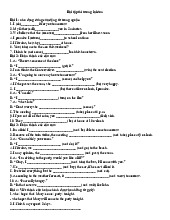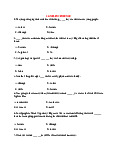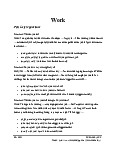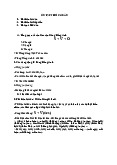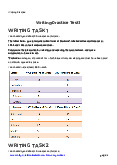


Preview text:
SPEAKING 2 A. PART 1: 1. Unit 1- Offbeat jobs:
a) Is there another type of job you would like to do?/ What do you plan to do in the future?
b) What was the dream job for you when you were young?
c) Have you changed your mind on your dream job?
d) Have you had a part-time job before?
2. Unit 2 – Where does the time go?
a) Do you like studying? Why / why not?
b) Do you prefer to study alone or with others? Why?
c) Where do you prefer to go when you need to study? Why?
d) What method of learning do you find best?
e) How do you feel if someone disturbs you when you are studying?
f) Do you multitask? If so, what do you do?
g) Do you procrastinate? Why or why not?
h) Who do you ask for advice when you face challenges?
3. Unit 3 – A penny saved is a penny earned:
a) Are you good at saving money?
b) How important is money to you?
c) Do you like to bargain with sellers when you shop? Why or why not?
d) Do you like to buy things used? Why or why not? If yes, what are some things that
you like to buy used? What are some things you never buy used?
e) What do you do with stuff that you don’t use anymore? Do you prefer to keep it,
throw it away, or give it to someone else? 4. Unit 4 – Etiquette:
a) Do you think you are a polite person?
b) Who taught you to be polite? 5. Unit 5 – The fat tax:
a) What’s your favorite food?
b) Are there any food you dislike?
c) Do you have a healthy diet?
d) Do you prefer dine in or dine out?
e) What was your favorite food when you were a child?
f) What types of food do you think are unhealthy?
6. Unit 6 – Everyday heroes:
a) Would you like to work as a volunteer?
b) Have you ever done any voluntary work?
c) What could you do to help if you had no money?
d) Would you volunteer to help people outside your community?
7. Unit 7 – Gaming your way to better health: a) Do you play video games?
8. Unit 8 – Endangered languages:
a) What languages do you speak?
b) Do you think that English is difficult to learn?
c) Do you like learning languages?
d) Do you want to became a foreign language teacher in the future? Why? B. PART 2: Dialogue Possible situations:
a) You are a student and a counselor. Student A, you need some help managing your
time and learning better study habits. You ask Student B, the counselor, for help.
b) You are a newly graduated student and a career counselor. Student A, you need to
find a job matching your desire and qualifications. You ask Student B, the counselor, for help.
c) You are a buyer and a seller in a shop. Student A, you want to buy something
(clothes, books, etc.) but do not have enough money. You bargain with Student B,
the seller, for a lower price.
d) You are a patient and a doctor. Student A, you have a health problem (obesity,
insomnia, etc.). You ask Student B, the doctor, for advice.
e) You are students who love to help your community. You discuss the problem in
your community that you think needs to be solved (homelessness, hunger,
pollution, etc.) and propose solutions to it. C. PART 3: 1. Unit 1 – Offbeat jobs:
a) What kinds of jobs are popular in Vietnam?
b) What job skills do you think are the most difficult to learn? Why do you think they are difficult?
c) What skills do you think are the most important for students to learn so they can
find a job or start a career in the future?
2. Unit 2 - Where does the time go?
a) Do you think it’s better for students to live at home with their families, or away from home?
b) What do you think is the most important factor in student success?
3. Unit 3 - A penny saved is a penny earned:
a) What kinds of things do people save money for?
b) Do you think it's easy for students to save money?
c) Do you think parents should teach their children about saving? 4. Unit 4 – Etiquette:
a) In your opinion, are people less polite these days than in the past? Give examples to explain your opinion.
b) In your country’s culture, how do you show that you are being polite?
c) Are we less polite with members of our families than with people we don’t know? 5. Unit 5 – The fat tax:
a) Is ‘fast food’ popular in your country?
b) Do you or, do people in your country generally prefer to eat at home or eat out?
c) Do you think Vietnamese people’s diet is healthy?
d) People should cook meal at home and avoid eat fast food? What do you think?
e) Why do you think some people choose to be vegetarians?
f) Is the food that people eat today different to the food that people used to eat in the
past? If yes, in what ways has it changed?
6. Unit 6 – Everyday heroes:
a) Why do you think people volunteer?
b) What are some of the ways people can help others in the community?
7. Unit 7 – Gaming your way to better health:
a) What are some advantages and disadvantages of playing video games?
8. Unit 8 – Endangered languages:
a) Why do people learn more than one language?
b) Do you think that all children should learn foreign languages at school?
